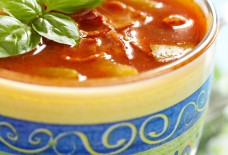6 Brilliant Arab Jazz Musicians You Need to Know
Jazz is a relatively new genre of music, originating in the late 19th to early 20th century as interpretations of American and European classical music entwined with African African folk, spiritual and work songs, as well as cultural influences from West African culture.
During the Cold War, the world was engulfed in an ideological and political stand-off while the United States struggled with its pro-democracy image abroad. Perceived by many countries as a culturally bereft, segregated, military giant the United States needed some major damage control for it’s image; and something powerful to combat the perceived threat of communism in the middle east.
Adam Clayton Powell Jr., the United States representative from Harlem and a jazz fan, came up with a brilliant act of foreign diplomacy to show the world the “real Americana.”
Instead of symphony orchestras and ballet companies to represent American culture abroad, why not send jazz bands on international tours?
They didn’t send just any bands; they sent Dizzy Gillepsie, Duke Ellington, Louis Armstrong and a host of other brilliant and influential Jazz musicians. These musicians were inspired by the culture of the region and worked local flavor into their performances and even in subsequent recordings. People in the region noticed and warmed to the Americans and the inclusivity and open minded nature of their music.
Thanks to these creative artists, “Jazz Diplomacy” movement was a swinging success globally, but especially in the Middle East
Since the Jazz Diplomacy movement, the genre has gained traction in the region. True to Jazz form, musicians from the region continue to draw from different musical cultures, local sounds and instruments and transform the inclusive genre into various distinct sub-styles and sounds.
Here are 6 talented Arab jazz musicians who have tapped into the ever-growing jazz scene in the Middle East and deserve to heard across the globe:
1. Toufic Farroukh
This French-Lebanese composer mixes traditional Arabic instruments with the sax and throws in some low-key dance tones guaranteed to have your feet tapping and fingers snapping in no time.
Farroukh’s combination of regional instruments like the oud with a double bass sound depicts how jazz can easily adapt to the beautiful blend of tradition and innovation.
2. Tarek Yamani
“The first time I heard jazz music, it changed my world,” said the Lebanese artist.
His jazz work in the Middle East has been praised as the perfect depiction of jazz’s inclusive nature, but he doesn’t just stop at Arabic beats and sounds. He aims to bring together rhythms from various cultures like Africa and Latin America, and reinvent the traditional sounds in jazz-centered recordings.
He also launched Beirut Speaks Jazz, a unique platform to raise jazz awareness in Lebanon.
3. Dhafer Youssef
Tunisian-born Youssef is known for his incredible blends of oriental jazz and electric sound mixes.
With an affinity towards Indian and Nordic music as well, Youssef’s work spreads across a broad spectrum covering ethno jazz, world fusion, qawwali, sufi, jazz fusion, new age and jazztronica.
4. Tara Tiba
An architecture graduate who decided to dedicate her life to music, Tiba developed an interest in Persian music at the age of sixteen that led her to embark on seven years of vocal training.
Her amazing vocal control and soulful voice has mesmerized many an audience, focusing on Persian jazz which features a combination of traditional Persian music with soothing improvised jazz melodies.
5. Amira Kheir
Anchoring her homeland’s tunes in jazz and soul composition, the Italian-Sudanese artist has been hailed as the “Diva of the Sudanese Desert”.
Her soulful compositions feature a blend of East and North African rhythms coupled with jazz improvisation and slight brushes of Afro-Latin and Neo-Soul beats weaved within, resulting in pithy and colorful albums.
6. Rabih Abou-Khalil
Often blending traditional Arab music with jazz, rock and classical music, Khalil’s music is typically categorized under ethno jazz and world fusion. The Lebanese musician studied under virtuoso Georges Farah in Beirut and later learned how to play classical flute in Munich under Walther Theurer.
Khalil was once described as “a world musician years before the phrase became a label, he makes the hot, staccato Middle Eastern flavor and the seamless grooves of jazz mingle as if they were always meant to.”



